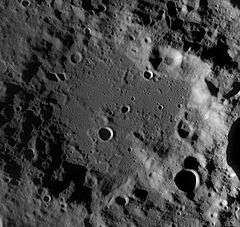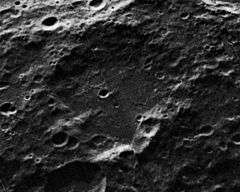van't Hoff (crater)
van 't Hoff is a lunar impact crater named after Dutch chemist Jacobus H. van 't Hoff and is located to the northeast of the walled plain Birkhoff, on the far side of the Moon. To the northwest is the crater Stebbins, and to the east lies the smaller Dyson.
 LRO image | |
| Coordinates | 62.1°N 131.8°W |
|---|---|
| Diameter | 92 km |
| Depth | Unknown |
| Colongitude | 134° at sunrise |
| Eponym | Jacobus H. van 't Hoff |

This crater lies at high northern latitudes of the lunar surface, almost two-thirds the way from the equator to the pole. The outer rim of van 't Hoff is heavily eroded and the crater has become distorted in shape by subsequent impacts. The rim edge is ill-defined in the western half where the inner wall is unusually wide. This edge may have become overlain by ejecta from other impacts to the west.
Along the eastern face the crater has apparently merged with one or two other impacts, producing an outward double-bulge. There are several smaller impacts along the eastern rim, and a gouge in the surface forms a trough leading away to the northeast for nearly a crater diameter. Much of the interior floor of van 't Hoff is relatively level, and is marked by some small craterlets. The most prominent of these is a small, cup-shaped crater in the southern half.
Satellite craters
By convention these features are identified on lunar maps by placing the letter on the side of the crater midpoint that is closest to van 't Hoff.
| van 't Hoff | Latitude | Longitude | Diameter |
|---|---|---|---|
| F | 61.5° N | 126.2° W | 41 km |
| M | 56.8° N | 132.1° W | 36 km |
| N | 57.9° N | 132.3° W | 46 km |
References
- Andersson, L. E.; Whitaker, E. A. (1982). NASA Catalogue of Lunar Nomenclature. NASA RP-1097.CS1 maint: ref=harv (link)
- Blue, Jennifer (July 25, 2007). "Gazetteer of Planetary Nomenclature". USGS. Retrieved 2007-08-05.CS1 maint: ref=harv (link)
- Bussey, B.; Spudis, P. (2004). The Clementine Atlas of the Moon. New York: Cambridge University Press. ISBN 978-0-521-81528-4.CS1 maint: ref=harv (link)
- Cocks, Elijah E.; Cocks, Josiah C. (1995). Who's Who on the Moon: A Biographical Dictionary of Lunar Nomenclature. Tudor Publishers. ISBN 978-0-936389-27-1.CS1 maint: ref=harv (link)
- McDowell, Jonathan (July 15, 2007). "Lunar Nomenclature". Jonathan's Space Report. Retrieved 2007-10-24.CS1 maint: ref=harv (link)
- Menzel, D. H.; Minnaert, M.; Levin, B.; Dollfus, A.; Bell, B. (1971). "Report on Lunar Nomenclature by the Working Group of Commission 17 of the IAU". Space Science Reviews. 12 (2): 136–186. Bibcode:1971SSRv...12..136M. doi:10.1007/BF00171763.CS1 maint: ref=harv (link)
- Moore, Patrick (2001). On the Moon. Sterling Publishing Co. ISBN 978-0-304-35469-6.CS1 maint: ref=harv (link)
- Price, Fred W. (1988). The Moon Observer's Handbook. Cambridge University Press. ISBN 978-0-521-33500-3.CS1 maint: ref=harv (link)
- Rükl, Antonín (1990). Atlas of the Moon. Kalmbach Books. ISBN 978-0-913135-17-4.CS1 maint: ref=harv (link)
- Webb, Rev. T. W. (1962). Celestial Objects for Common Telescopes (6th revised ed.). Dover. ISBN 978-0-486-20917-3.CS1 maint: ref=harv (link)
- Whitaker, Ewen A. (1999). Mapping and Naming the Moon. Cambridge University Press. ISBN 978-0-521-62248-6.CS1 maint: ref=harv (link)
- Wlasuk, Peter T. (2000). Observing the Moon. Springer. ISBN 978-1-85233-193-1.CS1 maint: ref=harv (link)